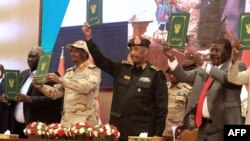The Quad and Troika countries (US, UK, Norway, UAE, KSA) welcomed Monday’s framework agreement between Sudan’s military generals and civilian groups, which is said to pave the way for restoring a civilian-led transitional government and lead the restive country to democratic elections.
WASHINGTON - Despite Western countries endorsing Sudan’s military-civilian framework agreement, the deal does not alter civilian-military relations in Sudan and the military likely will continue to have the upper hand, according to Center for Strategic and International Studies analyst Cameron Hudson.
“When you peel back the details of this agreement," Hudson said, "you see that the military and the RSF have retained, independent of the state, their powers and will continue to do so”.
The RSF (Rapid Support Forces) is a paramilitary force commanded by General Mohamed Hamdan Dagalo who doubles as deputy head of Sudan’s Sovereign Council.
Speaking on behalf of the Quad and Troika countries at the signing ceremony in Khartoum Monday, US Ambassador to Sudan, John Godfrey said "a concerted effort to finalize negotiations and reach an agreement quickly to form a new civilian-led government is essential to address Sudan’s urgent political, economic, security, and humanitarian challenges”.
The US diplomat added that the Biden Administration is "working with partners to coordinate significant economic support to a civilian-led transitional government in Sudan.”
Parties to Monday’s framework agreement agreed to continue negotiating a final deal to establish a civilian-led government and get the country back on a path to democratic transition.
The US and other Western partners suspended billions of dollars in assistance to Sudan following General Abdel Fattah al-Burhan's coup in October 2021. The World Bank and the IMF also put on hold a process that would see much of Sudan's $60-billion debt cancelled.
Godfrey urged all Sudanese stakeholders to seize the opportunity and join the process to reach a final agreement.
But Sudan’s regional partners have different interests for supporting Monday’s deal, according to Hudson, who says that the US and other Western partners might be too desperate to make progress on restoring a civilian-led government in Sudan.
“It’s a massive embarrassment for the international community, which had donor conferences and which celebrated Sudan’s civilian transition three years ago, that not only that transition failed but for the last year they have not been able to dislodge the military from its hold on power," Hudson told VOA. "They believe that any deficiencies in this agreement can be made up for in subsequent rounds of negotiations.”
To make this agreement credible, Hudson argues, the international community should have put significant pressure on the military to honor it by pledging serious consequences for spoilers.
The analyst said "We have to be clear-eyed about the fact that this document was written by spoilers, it was signed by spoilers, and for us to be thinking now about how to prevent this agreement from being spoiled, well, we have missed the whole point of this.”




